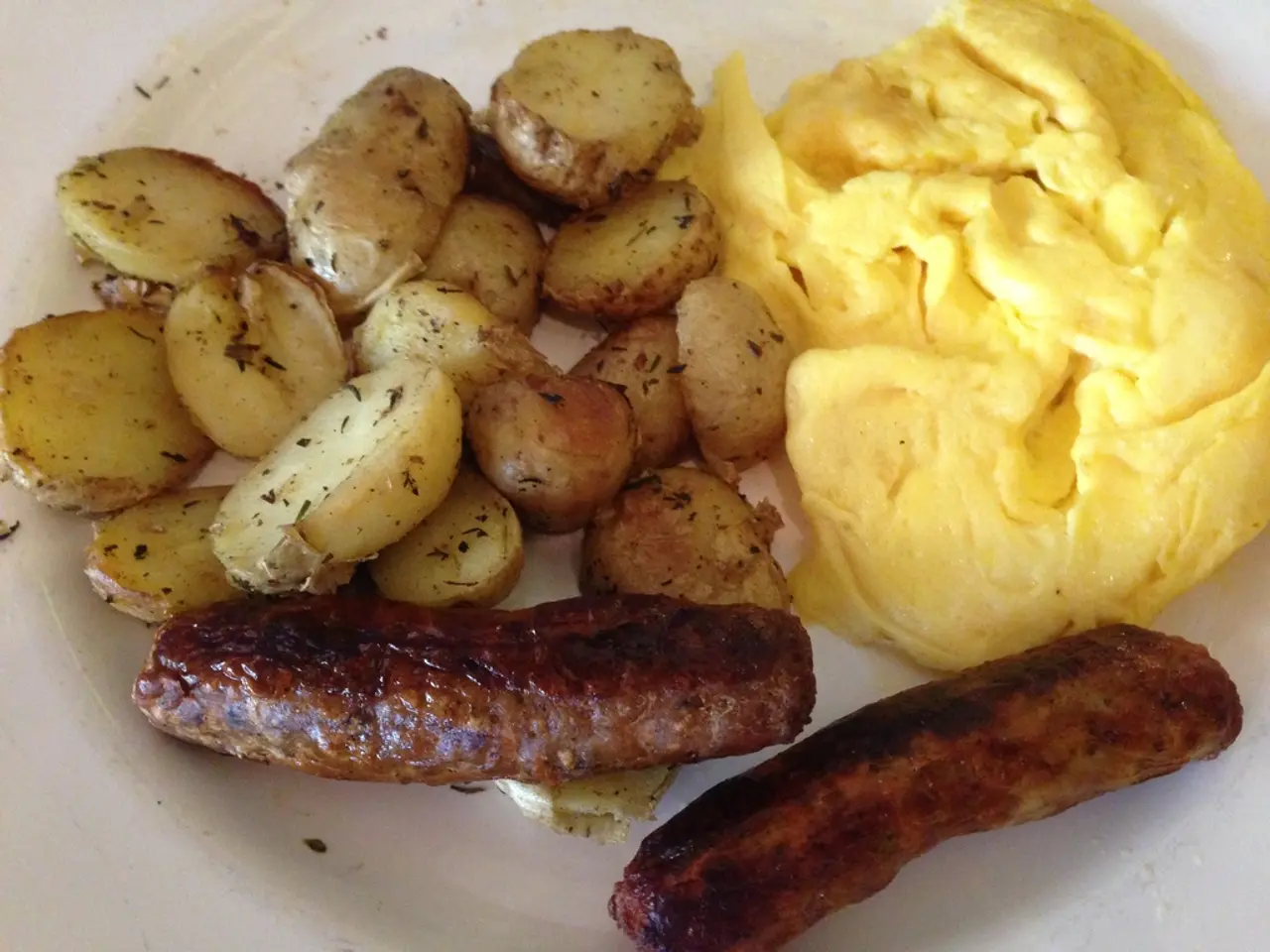Impact of Eggs on Gout: Guidelines and Culinary Suggestions
Eggs, a versatile food source, are a staple in many diets and are now being recognised as a beneficial addition to a gout-friendly diet. This is because eggs are low in purines, containing about 5 mg of purines per 100 grams, which is negligible [1][3].
A gout-friendly diet includes low-fat dairy, vegetables, whole grains, legumes, seeds, nuts, and eggs. Eggs can be prepared in various ways, such as scrambled eggs on whole grain toast or an omelette containing vegetables and low-fat cheese [2].
For effective gout management, the diet should focus on low-purine foods such as eggs, low-fat dairy (milk, yogurt, cheese), most vegetables (except some high-purine exceptions), fruits, whole grains, nuts, and plenty of water to help eliminate uric acid [1][3][5]. Emphasis should also be placed on anti-inflammatory foods to reduce flare-ups, including vegetables (excluding purine-rich ones like peas, asparagus, cauliflower), and maintaining a healthy weight [1][3][5].
However, it's important to note that while eggs are safe for consumption, fresh, uncooked eggs may contain Salmonella, a type of bacteria that can cause food poisoning. People at increased risk of severe Salmonella infection include children, older adults, pregnant individuals, people with weakened immune systems, and individuals who are pregnant [4].
To ensure egg safety, people should only buy eggs with an intact shell, store them in the refrigerator, use them within 3 weeks of purchase, store hard-boiled eggs in the fridge and eat them within 1 week, store cooked meals containing eggs in the fridge and eat them within 3-4 days, cook eggs until they are firm, and wash hands, utensils, and surfaces before and after handling raw eggs [4].
In addition to a gout-friendly diet, it's crucial to avoid or limit high-purine foods such as red meat, organ meats, shellfish, processed foods, refined carbohydrates, sugary drinks, and alcohol, as these can trigger gout attacks by increasing uric acid or inflammation [1][2][3][5].
While diet alone may not be enough to manage gout, it can play a significant role in supporting overall health and better managing gout symptoms in combination with other treatments [1]. The Arthritis Foundation recommends that people with gout also include vegetables, cherries, foods high in vitamin C, skim milk and low-fat dairy products, whole grain products, plant oils (such as olive oil), coffee, and limiting alcohol in their diet [6].
In summary, eggs are safe and beneficial in gout diets, while avoiding high-purine animal products, limiting alcohol, and focusing on low-purine, anti-inflammatory foods help reduce gout flare-ups [1][3][5]. Eating an egg a day may even have health benefits [7]. Always remember to prioritise food safety, especially when handling raw eggs.
References:
[1] https://www.ncbi.nlm.nih.gov/pmc/articles/PMC4633798/ [2] https://www.ncbi.nlm.nih.gov/pmc/articles/PMC5530876/ [3] https://www.ncbi.nlm.nih.gov/pmc/articles/PMC6356112/ [4] https://www.cdc.gov/foodsafety/salmonella/eggs.html [5] https://www.arthritis.org/health-wellness/diet/anti-inflammatory-diet/gout-diet [6] https://www.arthritis.org/health-wellness/diet/anti-inflammatory-diet/gout-diet [7] https://www.healthline.com/nutrition/eggs-benefits-and-risks#section1
- A healthy lifestyle, including a gout-friendly diet, can help predict the onset of diabetes, which is a risk factor for gout [5].
- In the realm of health-and-wellness, practicing fitness-and-exercise, combined with a gout-friendly diet, can prevent the degeneration of joint health due to gout.
- For those battling psoriasis, adhering to a gout-friendly diet can help mitigate the dryness of skin caused by systemic inflammation.
- Individuals with COPD may benefit from a gout-friendly diet, as it can reduce inflammation and lower the risk of asthma attacks, a common comorbidity with COPD.
- In type 2 diabetes management, it's essential to consider a gout-friendly diet, as high purine contents found in certain foods can worsen gout symptoms.
- Hepatitis patients dealing with the side effects of certain medications should be cautious about consuming high-purine foods, as they can exacerbate existing inflammation and gout symptoms.
- For macular degeneration patients, a gout-friendly diet rich in antioxidants, nutrients, and omega-3 fatty acids can help reduce inflammation, supporting eye health.
- Individuals dealing with depression may find solace in a gout-friendly diet, as a balanced diet can have a positive impact on mental health and overall well-being.
- A gout-friendly diet, emphasizing low-fat foods, whole grains, and plenty of fruits, can play a crucial role in breast cancer prevention and management.
- For cancer patients undergoing treatment, a gout-friendly diet will help with weight management, preventing obesity and its associated health risks.
- Science continues to explore the connection between nutrition, cooking, and gout management, with the potential for new discoveries in healthy-cooking techniques for gout-friendly diets.
- Incorporating a gout-friendly lifestyle, focusing on healthy-cooking, nutrition, food-and-drink choices, and regular fitness-and-exercise, can lead to optimal health and wellness.




